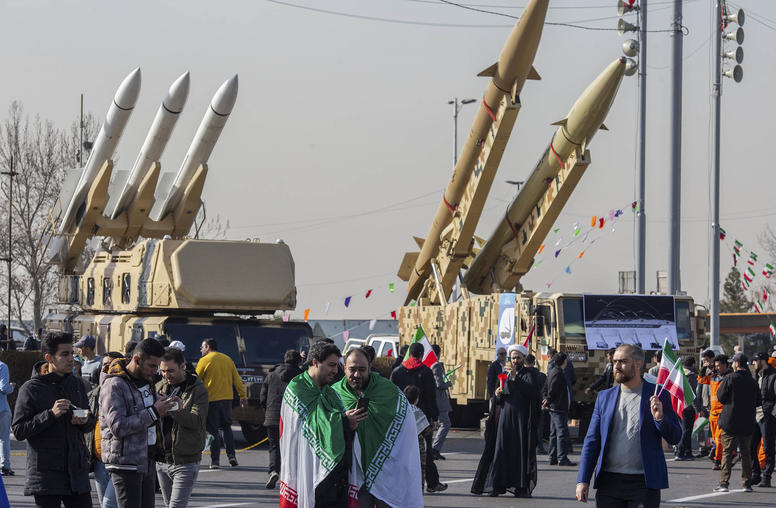The Peace Puzzle: Appendices and Resources
The last 20 years of American efforts to resolve the Arab-Israeli conflict have seen many more failures than successes. The Peace Puzzle offers uniquely objective account of the American role in the post-Cold War era. In writing The Peace Puzzle, the members of USIP's Study Group on Arab-Israeli Peacemaking had broad access to key policymakers and official archives in their research process, making this book one of few that offers a comprehensive history from the Madrid Conference through the end of Senator George Mitchell's term as Special Envoy to the Middle East in 2011.
The last 20 years of American efforts to resolve the Arab-Israeli conflict have seen many more failures than successes and "The Peace Puzzle" offers uniquely objective account of the American role in the post-Cold War era. "The Peace Puzzle" is the second volume published by USIP's Study Group on Arab-Israeli Peacemaking. The first volume, "Negotiating Arab-Israeli Peace: American Leadership in the Middle East," offers ten core lessons learned from peacemaking efforts in this conflict as well as policy recommendations for American administrations looking to undertake an effort to resolve the conflict. "The Peace Puzzle," co-published by USIP Press and Cornell University Press, is a comprehensive history of efforts to resolve the conflict from the Madrid Conference through the end of Senator George Mitchell's term as Special Envoy to the Middle East in 2011. Both volumes were made possible by the authors' broad access to key policymakers and official archives and their background as diplomats and analysts of the region.
Praise
“Read it and weep. 'The Peace Puzzle' brilliantly dissects what has gone wrong in what the all-star cast of authors rightly describes as ‘the decline of American Mideast diplomacy.’ The concluding summary of ‘lessons learned’ should be required reading for any American president who is serious about Arab-Israeli peace.”
- David Ignatius, columnist for The Washington Post and author of Body of Lies
"This is a superb account of the Arab-Israeli peace process. It offers remarkable insights into the process and exceptionally valuable lessons learned. It is the work of brilliant authors who possess unique knowledge and experience in this process. This is a must-read for anyone who desires to truly understand this critical and complex quest for Middle East peace."
- General Anthony Zinni, USMC (ret.), former commander-in-chief of the U.S. Central Command and former U.S. Special Envoy to Israel and the Palestinian Authority
"Because the window of the two-state solution is rapidly closing and the next American diplomatic attempt may be the last, the United States must avoid repeating some of the same mistakes that are well documented in this volume. This is not only an extremely well-researched account of what took place but also an important reminder that one cannot keep applying old policies to new realities."
- Marwan Muasher, Vice President for Studies at The Carnegie Endowment for International Peace; former Foreign Minister of Jordan}
About the Authors
Daniel C. Kurtzer is the S. Daniel Abraham Professor in Middle East Policy Studies at the Woodrow Wilson School at Princeton University. He retired in 2005 from the U.S. Foreign Service, having served as U.S. ambassador to Egypt (1997-2001) and Israel (2001-2005). He co-authored USIP's "Negotiating Arab-Israeli Peace: American Leadership in the Middle East."
Scott B. Lasensky, formerly a senior researcher at USIP, is a senior policy advisor at the Department of State. Lasensky also co-authored "Negotiating Arab-Israeli Peace."
William B. Quandt is the Edward R. Stettinius, Jr. Professor of Politics at the University of Virginia. His other books include "Peace Process:American Diplomacy and the Arab-Israeli Conflict Since 1967," "The Middle East: Ten Years After Camp David," and "Camp David: Peacemaking and Politics."
Steven L. Spiegel is a professor of Political Science and Director of the Center for Middle East Development at UCLA and a National Scholar at the Israel Policy Forum. He is the author of The Other Arab-Israeli Conflict: Making America's Middle East Policy, from Truman to Reagan.
Shibley Z. Telhami is the Anwar Sadat Professor of Peace and Development at the University of Maryland, College Park, and a Nonresident Senior Fellow at the Brookings Institution. He is the author of "The Stakes: America in the Middle East" and coeditor of "Identity and Foreign Policy in the Middle East."
Appendices
These documents are the appendices referenced in The Peace Puzzle, click on each title to download the document.
- U.S. Draft Declaration of Principles
- Israeli and Palestinian Comments on the the U.S. Draft Declaration of Principles
- Transition Paper: Bush to Clinton
- Ron Lauder's Letter to President Clinton and Lauder's Aims and Principles Document
- Lauder's Eight Points
- Lauder's Ten Points
- Draft Declaration of Principles: Syria to Israel
- Wye Letters of Assurance
- The Clinton Parameters
- Palestinian Response to the Clinton Parameters
- European Union Summary from the Taba Summit
- George W. Bush's June 24, 2002 Rose Garden Speech
- Letters Exchanged between President George W. Bush and Prime Minister Ariel Sharon



